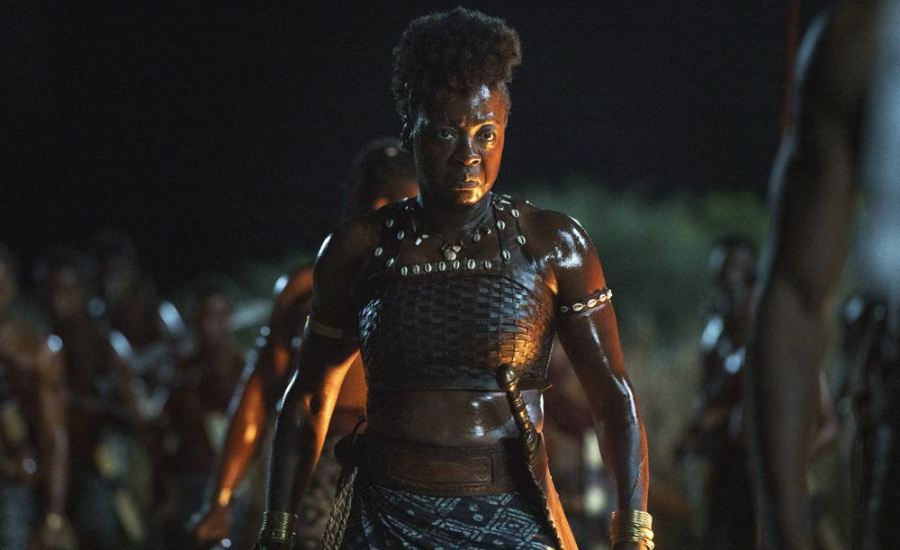Movie Buzz: Viola Davis taps into her 'warrior spirit' for 'The Woman King'
This image released by Sony Pictures shows Viola Davis in "The Woman King." (Sony Pictures via AP)
TORONTO (AP) — When Viola Davis, sculpted and hardened from months of training, first stood in the full garb of the Agojie warrior women, with her bare feet in the African sand, it was the culmination of not just the years-long push to make “The Woman King,” but of a lifelong battle.
“It was sort of metaphoric to not just everything I had done to prepare for this role but everything that I had done as a Black woman to prepare for this moment,” Davis says. “Which is to be a warrior.”
“The Woman King,” which opens in theaters Friday, is a $50 million action epic, set in 1820s West Africa, about the all-female army of the Kingdom of Dahomey. Made largely by women and featuring an almost completely Black cast, it’s powerfully unlike anything Hollywood has ever produced. And just as much as “The Woman King” dramatizes the fierce fighting of the Agojie, the film represents its own struggle.
Photo: Ilze Kitshoff
“Fighting for actors. Fighting for the director. You have to fight for the writer,” Davis, also a producer, said in an interview at the Toronto International Film Festival. “Years and years and years go by and you’re still fighting. You’re fighting for the budget. You’re fighting for even the commercial aspects of the story. You’re fighting for your hair. Fight. Fight. Fight.”
“Whenever you’re doing anything new, it requires the warrior spirit,” says Davis. “What I feel now is: It was worth it.”
“The Woman King,” directed by Gina Prince-Bythewood (“The Old Guard, “Love & Basketball”), began as an idea seven years ago, after a trip to Africa by Maria Bello, the producer and actor. Enamored by the history of the Agojie, she brought the concept to producer Cathy Schulman, the producer of the Oscar-winning “Crash” and the former head of Women in Film.
“There couldn’t be a more important time for a movie about female courage, about sisterhood, about the complexity of the female experience, not to mention the physicality of our bodies,” Schulman says.
Some have been skeptical of how “The Woman King” tackles history. Last month, the 1619 Project author Nikole Hannah-Jones wrote on Twitter that “it will be interesting to see how a movie that seems to glorify the all-female military unit of the Dahomey deals with the fact that this kingdom derived its wealth from capturing Africans for the trans-Atlantic slave trade.”
The Agojie were indeed a brutal and bloodthirsty army that participated in slave raids. “The Woman King,” like most historical epics, takes some artistic license. But the slave trade is a central component to its narrative. Schulman says the 1820s were chosen from the 1600-1904 history of the Dahomey kingdom specifically for the backdrop of conflict with the mightier Oyo empire, along with mounting pressure from European colonizers for captives.
“The Woman King” is hoping to make history of its own by blazing a new path for the film industry. The Sony Pictures release will hope to enliven movie theaters after a prolonged late-summer lull at the box office.
Davis has taken to calling “The Woman King” her “magnum opus” because her production company produced it, because she fought so hard for it.
“This was a hard-won battle,” says Davis. “And I won it. I feel like I won the battle.”







